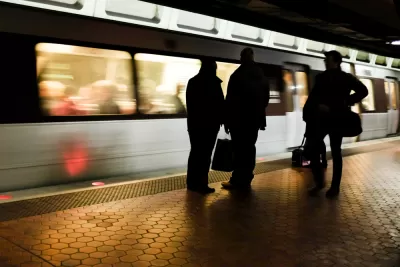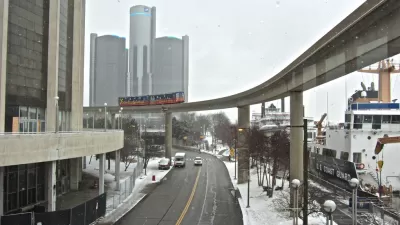The state assembly has asked the department of transportation to begin research and planning for a rapid transit line that would connect residents with jobs in Washington, D.C. and reduce traffic congestion in the region.

Southern Maryland workers may soon have more public transit options. Well, as soon as the state can “undertake all steps necessary to complete the design, engineering, and [environmental] process and secure a record of decision for the Southern Maryland Rapid Transit Project.”
According to an article by Bruce DePuyt in Maryland Matters, “Transportation experts have spent decades looking at the feasibility of building a transit line to serve Southern Maryland, but projects in other parts of the state always loomed larger in the eyes of policymakers.” Now, the General Assembly has tasked the state’s Department of Transportation with moving forward on a transit plan, thanks in part to $5 million federal earmark secured by state lawmakers. The article quotes State Senator Arthur Ellis (D-Charles), who says that 77 percent of the region’s working adults regularly commute to Washington, D.C., adding that they face the “worst commute in the nation.”
The project was recommended by a 2017 analysis, which “concluded that an 18.7 mile bus rapid transit system along the US 301/MD 5 corridor, from White Plains in Charles County to the Branch Avenue Metrorail Station in Prince George’s County, would be more cost-effective than light rail.” The report also supported transit-oriented development (TOD), adding, “TOD will provide higher land use density/intensity, help increase transit ridership to maximize transit investment, encourage economic growth and job creation, reduce the jobs-to-housing imbalance along the MD 5/US 301 corridor, and promote alternative transportation modes (e.g., walking, biking, transit) to reduce or eliminate the need to commute via automobile.”
FULL STORY: For the first time, Southern Maryland’s transit dreams are showing signs of life

Alabama: Trump Terminates Settlements for Black Communities Harmed By Raw Sewage
Trump deemed the landmark civil rights agreement “illegal DEI and environmental justice policy.”

Study: Maui’s Plan to Convert Vacation Rentals to Long-Term Housing Could Cause Nearly $1 Billion Economic Loss
The plan would reduce visitor accommodation by 25% resulting in 1,900 jobs lost.

Planetizen Federal Action Tracker
A weekly monitor of how Trump’s orders and actions are impacting planners and planning in America.

Wind Energy on the Rise Despite Federal Policy Reversal
The Trump administration is revoking federal support for renewable energy, but demand for new projects continues unabated.

Passengers Flock to Caltrain After Electrification
The new electric trains are running faster and more reliably, leading to strong ridership growth on the Bay Area rail system.

Texas Churches Rally Behind ‘Yes in God’s Back Yard’ Legislation
Religious leaders want the state to reduce zoning regulations to streamline leasing church-owned land to housing developers.
Urban Design for Planners 1: Software Tools
This six-course series explores essential urban design concepts using open source software and equips planners with the tools they need to participate fully in the urban design process.
Planning for Universal Design
Learn the tools for implementing Universal Design in planning regulations.
Caltrans
Smith Gee Studio
Institute for Housing and Urban Development Studies (IHS)
City of Grandview
Harvard GSD Executive Education
Toledo-Lucas County Plan Commissions
Salt Lake City
NYU Wagner Graduate School of Public Service





























